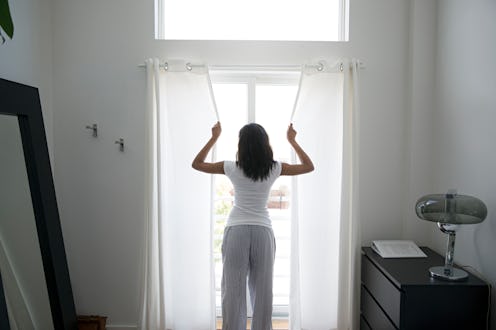Life
Domestic Violence Increases After Natural Disasters. Coronavirus Is No Different.

As the coronavirus pandemic spreads, many Americans are doing their part to “flatten the curve” by practicing social distancing, or staying isolated at home as much as possible to prevent spreading COVID-19. Though social distancing is an incredibly powerful public health tool to lessen the number of new coronavirus cases in the United States, one demographic could find their own health at increased risk: those in domestic violence situations.
“This is impacting survivors in every way you can imagine and every way you can’t,” Kelly Starr, managing director for public affairs at the Washington State Coalition Against Domestic Violence, tells Bustle.
Washington has been ground zero for COVID-19 cases in the United States, with the state’s Department of Health reporting 904 cases and 48 deaths as of March 16.
“We work with many low-income survivors,” Rachel Krinsky, executive director of LifeWire, which provides services to those impacted by domestic violence in the Seattle area, tells Bustle. “A lot of people have experienced homelessness or are homeless ... These are people who have worked to make their lives more stable. But they are now threatened by the fact that businesses are closing, schools are closing, the world is about to take this huge economic hit.” One person called Krinsky unsure of how she was going to pay her rent or buy groceries because her company was already facing layoffs. Others have called to ask what to do if they get sick with COVID-19, knowing that both their care and their children’s is at the mercy of the abusive partner.
“Abuse is about power and control,” Crystal Justice, the chief development and marketing officer at the National Domestic Violence Hotline, tells Bustle. “And an abuser will use any situation to get more power — including the present one with COVID-19.”
Friends and family members of survivors are going to be the first responders.
The World Health Organization (WHO) notes a consistent rise in interpersonal violence incidents following any natural disaster. After Hurricane Maria hit Puerto Rico in 2017, one organization saw a 62% increase in requests for support. The same was true after 2005’s Hurricane Katrina in New Orleans, and after North Carolina’s Hurricane Floyd in 1999. No matter where or when a large-scale disaster hits, an increase in reports of domestic violence follows.
The reason for these surges is that isolation increases after a natural disaster, and isolation is one of the most powerful tools used to control a survivor. “[These circumstances] could escalate things as an abuser continues to control you, monitor you, and isolate you from further support,” Starr says, though she emphasizes that social distancing won’t make someone abusive who isn’t already.
In a potential quarantine situation, a survivor may be in even closer proximity than usual to their abuser, Justice says. The usual things survivors do to get time away from them — going to work, seeing family or friends, or working out at the gym — may now be removed from them completely. Since people often stay with an abusive partner because they can’t financially support themselves or children, Starr points out, losing wages or jobs due to COVID-19-related shutdown policies can escalate someone’s precarity.
“When families are home together 24/7, the usual strategies that survivors use to reach out for help or to make an exit plan or get necessary resources or supplies together fall apart,” Krinsky says. “If no one is leaving the house, those windows disappear for them.”
Right now, Justice says, the best thing for anyone in any kind of domestic violence situation to do is evaluate their safety plan. She notes that many abusive partners might attempt to spread misinformation, telling their partner that their city is on lockdown when it in fact is not, as a means of trying to keep them from accessing resources that can help them. Justice says text and chat are “particularly important” for people sharing a home with their abuser. The National Domestic Violence Hotline can be reached 24/7 at 1-800-799-7233 or by texting LOVEIS to 22522.
An abuser will use any situation to get more power — including the present one with COVID-19.
Just as social distancing requires that people check in on their elderly or immunocompromised neighbors, or even their coworkers who live alone, people affected by violence at home need community support too.
“Even in the best of circumstances ... the folks survivors reach out to are their friends and family and colleagues and neighbors. And that doesn't have to change when people are isolated,” Starr says. “Friends and family members of survivors are going to be the first responders.”
In some ways, Starr says, checking in is easier than ever right now, since everyone wants to see how people are feeling as we weather the coronavirus pandemic together. “We can still chat online, pick up the phone, call one another,” she says. And by doing so, we can all potentially be a lifeline to a survivor.
If you or someone you know is experiencing any form of domestic violence, you can reach the National Domestic Violence Hotline 24/7 at 800-799-7233, by texting LOVEIS to 22522, or through online chat. To learn more about how you can be an informed friend or family member to a domestic violence survivor, you can learn more through the Washington State Coalition Against Domestic Violence’s Friends & Family Guide.